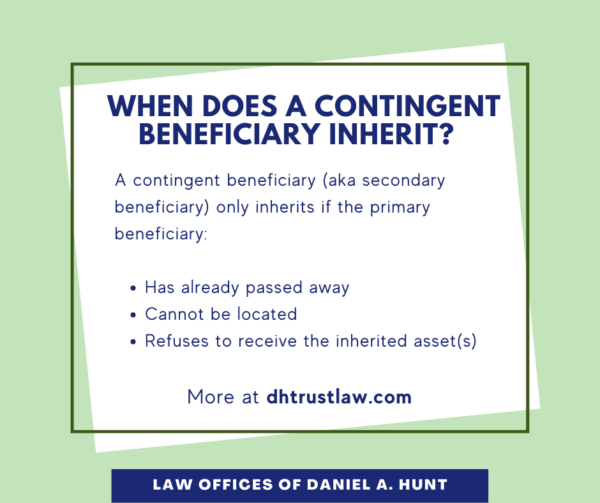What is a Contingent Beneficiary?

Whether you’re creating an estate plan or dealing with non-probate assets, you‘ll need to decide who to name as the beneficiary of your assets. Typically you will choose at least one primary beneficiary and at least one contingent beneficiary. Here’s an introduction to what a contingency beneficiary is, how to choose one, and why it’s important.
What is a Contingent Beneficiary?
A beneficiary is a person you designate in your estate planning documents to inherit your estate assets after you pass away. These assets may include real estate, bank accounts, investments, personal property, etc.
Certain non-probate assets that get distributed outside of an estate plan also require you to list a beneficiary. For example:
- Life insurance policies
- Retirement accounts like 401(k)s, IRAs, or 403bs
- Annuities
- Transfer on Death (TOD) or Pay on Death (POD) accounts
The first person listed to inherit your estate plan or a non-probate account is called a primary beneficiary. A contingent beneficiary is a person or organization next in line to inherit after the primary beneficiary. A contingent beneficiary is sometimes called a secondary beneficiary or alternate beneficiary.
When Does a Contingent Beneficiary Inherit?
Your contingent beneficiary will only receive your property if your primary beneficiary has died, cannot be located, or refuses to receive the inheritance.
For example, let’s say you have two children, a daughter and a son. Suppose you name your daughter as the primary beneficiary and your son as the contingent beneficiary in your estate plan. In that case, this means that your daughter will likely receive your assets when you die while your son will receive nothing.
However, if your daughter predeceases you, declines to inherit the assets, or cannot be found at the time of the estate administration, your son would inherit the assets under those circumstances.
Who to Choose as a Contingent Beneficiary
When choosing a contingent beneficiary, you can choose any person or entity you desire. If a person or entity can be a primary beneficiary, they can also be a contingent beneficiary. This includes:
- A person, such as a family member or friend. They do not need to be a relative in order to be named as a beneficiary in your estate plan.
- A nonprofit organization such as a charity, church, or educational institution. Including a nonprofit entity in your estate plan is a meaningful way of giving back to a cause that is personally meaningful to you.
There are a few restrictions to consider when choosing a contingent beneficiary. Minors generally aren’t allowed to own property until they become an adult (usually at the age of 18). If you want to name your minor children as beneficiaries, be aware that the guardian(s) you name in your estate plan will manage their inheritance until they become an adult.
Pet lovers should know that you can’t list a pet as a beneficiary. Since pets are considered property in the eyes of the law, they can’t directly inherit assets. But you can ask your successor to care for your pet after you’re gone and designate certain funds for their care.
What Happens Without a Contingent Beneficiary?
Failing to name a contingent beneficiary for your assets can cause problems later if your primary beneficiary is unable or unwilling to inherit. In this situation, the rules of intestate succession determine who will inherit your estate.
Intestate succession usually prioritizes your surviving spouse or domestic partner, followed by your children, then parents, siblings, grandparents, and extended family members. This default distribution rarely matches what the decedent would have chosen for themself and may have negative tax consequences on the beneficiaries.
Be sure to consult an estate planning attorney for help designing an estate plan that includes your desired beneficiaries. If you have any questions about contingent beneficiaries, feel free to contact our law firm.
Law Offices of Daniel A. Hunt
The Law Offices of Daniel A. Hunt is a California law firm specializing in Estate Planning; Trust Administration & Litigation; Probate; and Conservatorships. We've helped over 10,000 clients find peace of mind. We serve clients throughout the greater Sacramento region and the state of California.




